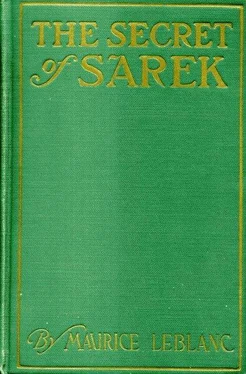Maurice Leblanc - The Secret of Sarek
Здесь есть возможность читать онлайн «Maurice Leblanc - The Secret of Sarek» весь текст электронной книги совершенно бесплатно (целиком полную версию без сокращений). В некоторых случаях можно слушать аудио, скачать через торрент в формате fb2 и присутствует краткое содержание. Жанр: Классический детектив, на английском языке. Описание произведения, (предисловие) а так же отзывы посетителей доступны на портале библиотеки ЛибКат.
- Название:The Secret of Sarek
- Автор:
- Жанр:
- Год:неизвестен
- ISBN:нет данных
- Рейтинг книги:4 / 5. Голосов: 1
-
Избранное:Добавить в избранное
- Отзывы:
-
Ваша оценка:
- 80
- 1
- 2
- 3
- 4
- 5
The Secret of Sarek: краткое содержание, описание и аннотация
Предлагаем к чтению аннотацию, описание, краткое содержание или предисловие (зависит от того, что написал сам автор книги «The Secret of Sarek»). Если вы не нашли необходимую информацию о книге — напишите в комментариях, мы постараемся отыскать её.
The Secret of Sarek — читать онлайн бесплатно полную книгу (весь текст) целиком
Ниже представлен текст книги, разбитый по страницам. Система сохранения места последней прочитанной страницы, позволяет с удобством читать онлайн бесплатно книгу «The Secret of Sarek», без необходимости каждый раз заново искать на чём Вы остановились. Поставьте закладку, и сможете в любой момент перейти на страницу, на которой закончили чтение.
Интервал:
Закладка:
"He spoke: and the whole tribe set out upon its journey."
Patrice Belval was greatly amused; and Stephane, infected by his hilarity, began to feel more cheerful. But Don Luis now addressed his remarks to them:
"There's nothing to laugh at! All this is very serious. It's not a story for children who believe in conjuring tricks and sleight of hand, but a real history, all the details of which will, as you shall see, give rise to precise, natural and, in a sense, scientific explanations. Yes, ladies and gentlemen, scientific: I am not afraid of the word. We are here on scientific ground; and Vorski himself will regret his cynical merriment."
Don Luis took a second sip of water and continued:
"For weeks and months the tribe followed the course of the Elbe; and one evening, on the stroke of half-past nine, reached the sea-board, in the country which afterwards became the country of the[Pg 312] Frisians. It remained there for weeks and months, without finding the requisite security. It therefore determined upon a fresh exodus.
"This time it was a naval exodus. Thirty boats put out to sea-observe this number thirty, which was that of the families composing the tribe-and for weeks and months they wandered from shore to shore, settling first in Scandinavia, next among the Saxons, driven off, putting to sea again and continuing their voyage. And I assure you it was really a strange, moving, impressive sight to see this vagrant tribe dragging in its wake the tombstone of its kings and seeking a safe, inaccessible and final refuge in which to conceal its idol, protect it from the attack of its enemies, celebrate its worship and employ it to consolidate the tribal power.
"The last stage was Ireland; and it was here that, one day, after they had dwelt in the green isle for half a century or perhaps a century, after their manners had acquired a certain softening by contact with nations which were already less barbarous, the grandson or great-grandson of the great chief, himself a great chief, received one of the emissaries whom he maintained in the neighbouring countries. This one came from the continent. He had discovered the miraculous refuge. It was an almost unapproachable island, protected by thirty rocks and having thirty granite monuments to guard it.
"Thirty! The fateful number! It was an obvious summons and command from the mysterious deities. The thirty galleys were launched once more and the expedition set forth.
"It succeeded. They took the island by assault. The natives they simply exterminated. The tribe[Pg 313] settled down; and the tombstone of the Kings of Bohemia was installed… in the very place which it occupies to-day and which I showed to our friend Vorski. Here I must interpolate a few historical data of the greatest significance. I will be brief."
Adopting a professorial tone, Don Luis explained:
"The island of Sarek, like all France and all the western part of Europe, had been inhabited for thousands of years by a race known as the Liguri, the direct descendants of the cave-dwellers part of whose manners and customs they had retained. They were mighty builders, those Liguri, who, in the neolithic period, perhaps under the influence of the great civilizations of the east, had erected their huge blocks of granite and built their colossal funeral chambers.
"It was here that our tribe found and made great use of a system of caves and natural crypts adapted by the patient hand of man and of a cluster of enormous monuments which struck the mystic and superstitious imagination of the Celts.
"We find therefore that, after the first or wandering phase, there begins for the God-Stone a period of rest and worship which we will call the Druidical period. It lasted for a thousand or fifteen hundred years. The tribe became mingled with the neighbouring tribes and probably lived under the protection of some Breton king. But, little by little, the ascendancy had passed from the chiefs to the priests; and these priests, that is to say, the Druids, assumed an authority which increased in the course of the generations that followed.
"They owed this authority, beyond all doubt, to the miraculous stone. True, they were the priests[Pg 314] of a religion accepted by all and also the instructors of Gallic childhood (it seems certain, incidentally, that the cells under the Black Heath were those of a Druid convent, or rather a sort of university); true, in obedience to the practices of the time, they presided over human sacrifices and ordained the gathering of the mistletoe, the vervain and all the magic herbs; but, before all, in the island of Sarek, they were the guardians and the possessors of the stone which gave life or death. Placed above the hall of the underground sacrifices, it was at that time undoubtedly visible in the open air; and I have every reason to believe that the Fairies' Dolmen, which we now see here, then stood in the place known as the Calvary of the Flowers and sheltered the God-Stone. It was there that ailing and crippled persons and sickly children were laid to recover their health and strength. It was on the sacred slab that barren women became fruitful, on the sacred slab that old men felt their energies revive.
"In my eyes it dominates the whole of the legendary and fabled past of Brittany. It is the radiating centre of all the superstitions, all the beliefs, all the fears and hopes of the country. By virtue of the stone or of the magic sceptre which the archdruid wielded and with which he burnt men's flesh or healed their sores at will, we see the beautiful tales of romance springing spontaneously into being, tales of the knights of the Round Table, tales of Merlin the wizard. The stone is at the bottom of every mystery, at the heart of every symbol. It is darkness and light in one, the great riddle and the great explanation."
[Pg 315]Don Luis uttered these last words with a certain exaltation. He smiled:
"Don't let yourself be carried away, Vorski. We'll keep our enthusiasm for the narrative of your crimes. For the moment, we are at the climax of the Druidical period, a period which lasted far beyond the Druids through long centuries during which, after the Druids had gone, the miraculous stone was exploited by the sorcerers and soothsayers. And thus we come gradually to the third period, the religious period, that is to say, actually to the progressive decline of all that constituted the glory of Sarek: pilgrimages, commemorative festivals and so forth.
"The Church in fact was unable to put up with that crude fetish-worship. As soon as she was strong enough, she was bound to fight against the block of granite which attracted so many believers and perpetuated so hateful a religion. The fight was an unequal one; and the past succumbed. The dolmen was moved to where we stand, the slab of the kings of Bohemia was buried under a layer of earth and a Calvary rose at the very spot where the sacrilegious miracles were once wrought.
"And, over and above that, there was the great oblivion!
"Let me explain. The practices were forgotten. The rites were forgotten and all that constituted the history of a vanished cult. But the God-Stone was not forgotten. Men no longer knew where it was. In time they even no longer knew what it was. But they never ceased to speak of and believe in the existence of something which they called the God-[Pg 316]Stone. From mouth to mouth, from generation to generation, they handed down on to one another fabulous and terrible stories, which became farther and farther removed from reality, which formed a more and more vague and, for that matter, a more and more frightful legend, but which kept alive in their imaginations the recollection of the God-Stone and, above all, its name.
"This persistence of an idea in men's memories, this survival of a fact in the annals of a country had the logical result that, from time to time, some enquiring person would try to reconstruct the prodigious truth. Two of these enquiring persons, Brother Thomas, a member of the Benedictine Order, who lived in the middle of the fifteenth century, and the man Maguennoc, in our own time, played an important part. Brother Thomas was a poet and an illuminator about whom we possess not many details, a very bad poet, to judge by his verses, but as an illuminator ingenuous and not devoid of talent. He left a sort of missal in which he related his life at Sarek Abbey and drew the thirty dolmens of the island, the whole accompanied by instances, religious quotations and predictions after the manner of Nostradamus. It was this missal, discovered by Maguennoc aforesaid, that contained the famous page with the crucified women and the prophecy relating to Sarek; it was this missal that I myself found and consulted last night in Maguennoc's bedroom.
Читать дальшеИнтервал:
Закладка:
Похожие книги на «The Secret of Sarek»
Представляем Вашему вниманию похожие книги на «The Secret of Sarek» списком для выбора. Мы отобрали схожую по названию и смыслу литературу в надежде предоставить читателям больше вариантов отыскать новые, интересные, ещё непрочитанные произведения.
Обсуждение, отзывы о книге «The Secret of Sarek» и просто собственные мнения читателей. Оставьте ваши комментарии, напишите, что Вы думаете о произведении, его смысле или главных героях. Укажите что конкретно понравилось, а что нет, и почему Вы так считаете.












